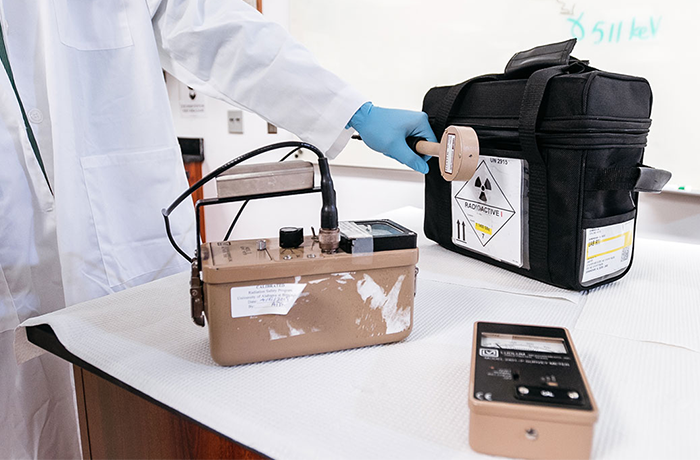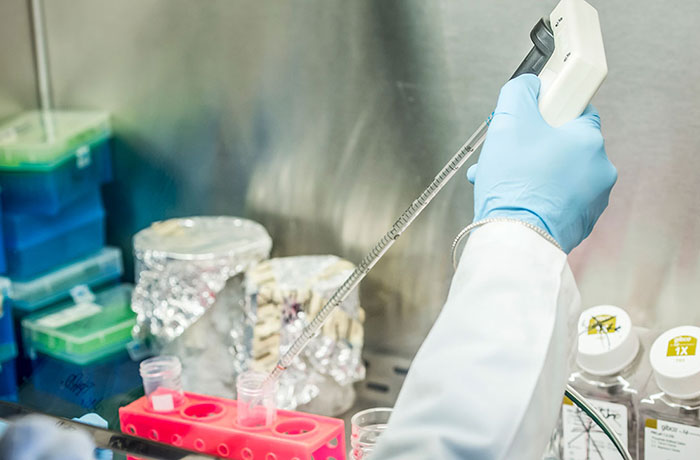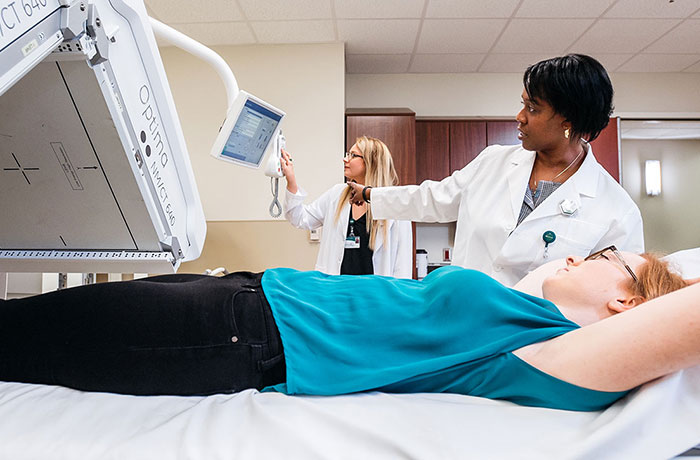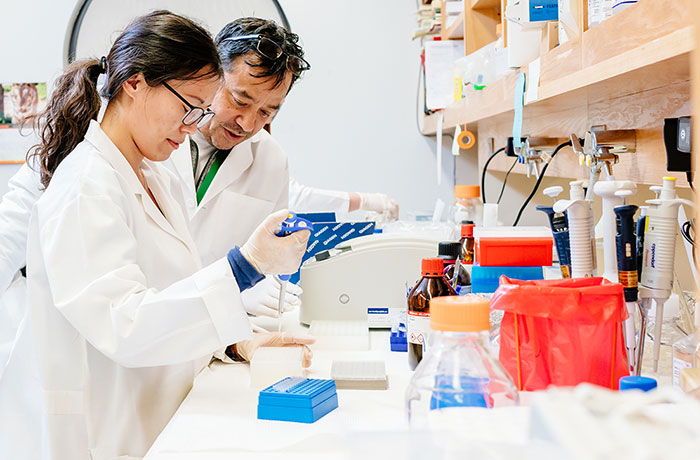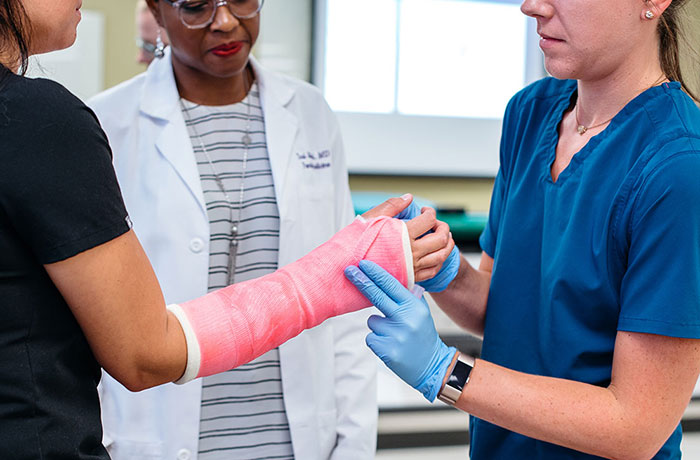Careers
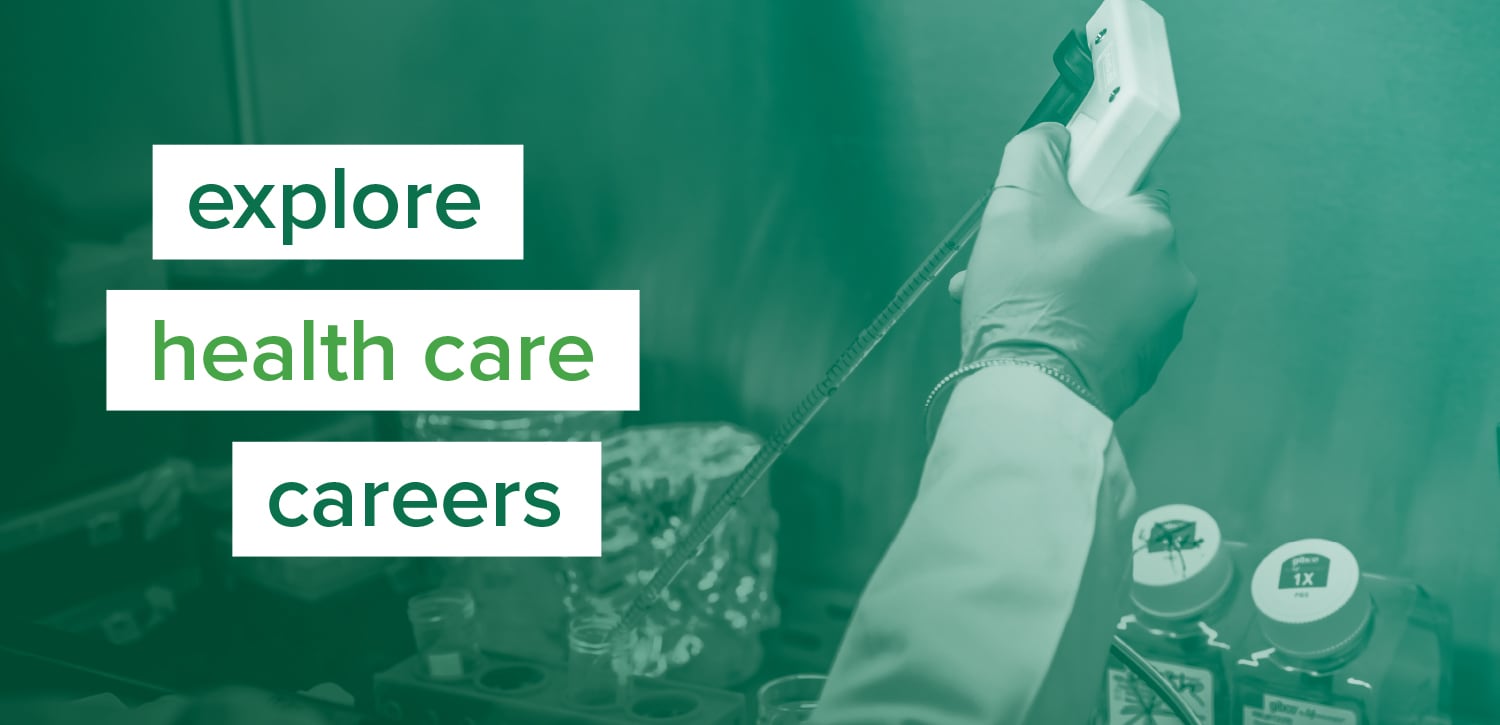
We know that your college experience is important, but what matters more is how you can use your newfound knowledge to impact the world around you after graduation. The UAB School of Health Professions can help you find an exciting career that is focused on improving the health and wellbeing of others.
Genetic Counselor

Genetic counselors are healthcare professionals who combine their passion for science and desire to help others to provide specialized expertise in many areas of medicine and industry. As a genetic counselor, you learn to assess risk for a variety of genetic conditions based on an individual’s medical and family history. Genetic counselors discuss genetic testing options and support informed decision making by providing education to patients on genetic concepts and potential testing results at a level the patient can understand. Genetic counselors also use their counseling skills to support individuals and families throughout the diagnostic process to help patients address the emotional implications of their diagnosis. Genetic counselors can work in many areas of medicine including prenatal care, pediatrics, oncology, cardiology, neurology, and others. Genetic counselors can also have non-clinical roles, which include working for research studies, genetic testing laboratories, insurance companies, and in public policy just to name a few.
-
Percent Change in Employment, Projected 2018 - 2028 27%Genetic counselors
-
10% Other healthcare practitioners and technical occupations
-
5% Total, all occupations
Note: All Occuations include all occupations in the U.S. Economy
Source: U.S. Bureau of Labor Statistics, Employment Projections program
Outlook and demand
Demand for genetic counselors is projected to grow 27 percent from 2018 to 2028, much faster than the average for all occupations. Ongoing technological innovations, including lab tests and developments in genomics, has increased the utilization of genetic testing across many areas of healthcare. This increase in the number and types of tests available to patients has increased the need for genetic counselors, who are able to identify appropriate testing based on a patient’s history, explain the testing and results implications to patients and providers.
Employers look for professionals who can:
- Demonstrate critical thinking including the ability to assimilate, analyze, synthesize, and integrate concepts and to problem solve in a timely fashion.
- Explain complex concepts, medical procedures and test results to patients and families while providing emotional support
- Educate medical professionals and others regarding genetics and genetic conditions that impact daily living
Paths that can lead to this career
An M.S. in Genetic Counseling is required for genetic counselors entering into the profession, and genetic counselors need to be certified. Please note, this program requires an application to National Match Services and interview process for admission, as well as an application to the UAB Graduate School.
-
High School
If you're currently in high school and interested in becoming a genetic counselor, you can do the following steps to prepare for this career:
- Explore majors based in science or health care, such as UAB's Biomedical Sciences Major and Health Care Management Major.
- Find opportunities to job shadow genetic counselors.
- Find volunteer positions in a crisis counseling or peer counseling organization.
-
Undergraduate
If you're currently an undergraduate and interested in becoming a genetic counselor, you can do the following steps to prepare for this career:
- Complete any bachelor degree with a B or greater in the following prerequisite courses:
- Biology I
- Biology II
- Biochemistry
- Genetics
- Statistics
- Psychology
- Find opportunities to job shadow and interview a genetic counselor to complete an application requirement.
- Gain paid or volunteer experience in a crisis counseling or peer counseling setting, or with individuals with genetic conditions or risk, special needs, or chronic illnesses.
- Earn research or teaching experience in biology or genetics.
- Study and schedule a time to take the GRE exam. UAB's code for the GRE is 7801.
-
Graduate
If you already have a bachelor's degree, the following courses will help you in this program:
- Biology I
- Biology II
- Biochemistry
- Genetics
- Statistics
- Psychology
Job titles and employers
Did you know?
With programs like theAlabama Genomic Health Initiativeand thePrecision Medicine Institute UAB is bringing precision medicine to Alabama and beyond.
Genetic Counselor
Places of work for this career:
- Hospitals
- Medical and Diagnostic Laboratories
- Physician Offices
- Colleges and Universities
To find out detailed salary information and more information on this career, you can explore the Department of Labor's O*Net database..
Organizations to check out for this career:
- American Board of Genetic Counseling
- Collaborative Group of the Americas on Inherited Colorectal Cancer
- National Society of Genetic Counselors
- Occupational Outlook Handbook: Genetic counselors
- Organization of Teratology Information Specialists
- Teratology Society
- The American Society of Human Genetics
Next steps
Explore
Find out more information about the Genetic Counseling program.
Get Started
Learn more about admissions and financial aid now.
Ask
Contact us at
Pharmacologist

Pharmacology is the science of drugs and how the body responds to the drug. In a career as a pharmacologist, you could be on the front lines of research, testing medications and chemical compounds that will be used to treat and prevent major diseases. New areas in pharmacology are rapidly evolving, including personalized precision medicine and gene therapy, regenerative tissue development, and nanotechnology-based approaches used to fight diseases.
Often confused with pharmacy, pharmacology is a separate discipline in the health sciences. As a pharmacologist, you will learn to design and test new and/or existing therapeutic drugs to achieve optimal therapeutic outcomes. Pharmacists on the other hand, ensure the proper dosage and composition of the medication is dispensed to the patient or utilized in clinical trials. Pharmacology integrates the knowledge of many disciplines, including biochemistry, physiology, medicine, and pharmacy. This integrative nature allows pharmacology to make unique and significant contributions to human health.
Outlook and demand
Demand is projected to increase for medical scientists such as pharmacologists. A larger and aging population, increased rates of several chronic conditions, and a growing reliance on pharmaceuticals are all factors that are expected to increase demand for pharmacologists.
Pharmacologists will be needed for research related to drugs and clinical trial development to treat diseases such as AIDS, Alzheimer’s disease, and cancer. In addition, the increasing frequency of international travel may facilitate the spread of existing diseases and give rise to new ones. Pharmacologists will continue to be needed because they contribute to the development of treatments and medicines that improve human health.
Employers look for professionals who can:
- Direct medical science or healthcare programs.
- Plan biological research.
- Monitor operational procedures in technical environments to ensure conformance to standards.
- Prepare scientific or technical reports or presentations.
- Operate laboratory or field equipment.
Paths that can lead to this career
To become a pharmacologist, you will need a bachelor’s degree in a science-related field. Depending on your chosen career field, a master's, Ph.D., or other professional doctoral degree may be required. UAB's M.S. in Biomedical and Health Sciences is a one year program that can help you prepare for a variety of other professional healthcare programs.
-
High School
If you're currently in high school and interested in becoming a pharmacologist you can do the following steps to prepare for this career:
- Explore majors based in science or health care, such as UAB's Biomedical Sciences Major and Health Care Management Major.
- Find opportunities for hands-on research experience that will help you learn how to solve problems and think like a scientist.
-
Undergraduate
If you're currently an undergraduate and interested in becoming a pharmacologist, you can do the following steps to prepare for this career:
- Complete any bachelor degree from an accredited university, however it is recommended you take:
- General Chemistry
- Organic Chemistry
- Biochemistry
- Biology with a lab
- Mammalian Physiology
- Microbiology
- Physics
- Calculus
- Statistics
- English
- Economics
- Find opportunities for hands-on research experience that will help you learn how to solve problems and think like a scientist.
- If you're interested in a one year Master's program to prepare for professional school or to get a more advanced background of the biomedical sciences, you can attend a UAB M.S. in Biomedical and Health Sciences Information Session.
-
Graduate
If you already have a bachelor's degree, the following courses will help you in this program:
- General Chemistry
- Organic Chemistry
- Biochemistry
- Biology with a lab
- Mammalian Physiology
- Microbiology
- Physics
- Calculus
- Statistics
- English
- Economics
- Physics
- Calculus
- Statistics
- English
- Economics
If you are interested in the development, manufacturing and commercial distribution of drugs, biologics and medical devices you may also be interested in the UAB Biotechnology Regulatory Affairs Certificate.
Job titles and employers
Pharmacologist
Places of work for this career:
- Academia (Professor, Lab Manager, Researcher)
- Non-Profits
- Government (Staff Scientist, Director of Regulatory Affairs)
- Pharmaceutical Industry (Director of Research, Medical Science Liaison)
- Law (Tech Transfer Specialist, Patent Lawyer)
- Science Policy and Outreach (Policy Analyst or Advisor, Public Affairs Director, Outreach Director, Government Affairs Specialist, Consultant)
- Science Writing (Author, Editor, Freelance Writer, Medical Writer)
To find out detailed salary information and more information on this career, you can explore the Department of Labor's O*Net database..
Organizations to check out for this career:
- American Society for Pharmacology and Experimental Therapeutics (ASPET)
- American Association for Cancer Research
- American Association for the Advancement of Science
- American Association of Bioanalysts
- American Association of Pharmaceutical Scientists
- American Chemical Society
- American Federation for Medical Research
- American Society for Investigative Pathology
Next steps
Explore
Find out more information about the M.S. in Biomedical and Health Sciences program.
Get Started
Learn more about admissions and financial aid now.
Ask
Contact us at
Health Physicist

A career in health physics, also referred to as the science of radiation protection, is a profession devoted to protecting people from potential radiation hazards, while making it possible to enjoy the beneficial uses of radiation. As a health physicist you can work with and manage radiation safety across all industry. Hospitals, clinics, and major medical centers use radiation sources, including x-ray machines, particle accelerators, lasers, and many other types of radiation that have to be managed and are regulated to ensure safety to humans. Health physicists are needed to ensure proper and safe working conditions for anyone who use or could be exposed to radiation.
-
Percent Change in Employment, Projected 2018 - 2028 8%Medical Scientists
-
6% Health technologist and technicians
-
5% Total, all occupations
Note: All Occuations include all occupations in the U.S. Economy
Source: U.S. Bureau of Labor Statistics, Employment Projections program
Outlook and demand
Employment of medical scientists such as health physicists are projected to grow 8 percent from 2018 to 2028, faster than the average for all occupations. A larger and aging population, increased rates of several chronic conditions are all factors that are expected to increase demand for medical scientists. Continued advancements in the detection of cancer and the development of more sophisticated treatment techniques may also lead to greater demand for radiation therapy.
Employers look for professionals who can:
- Ability to pick up on visuals cues in structure, equipment, or procedures that may pose a threat
- Evaluate your data and samples to draw conclusions about the health of the environment and the public
- Presenting verbal and written analysis of your findings, as well as interact with the public when gathering information
- Have lab skills and familiarity with testing procedures and equipment to run samples
Paths that can lead to this career
An M.S. in Health Physics can prepare you for a career as a health physicist or radiation safety officer. Certification as a health physicist is obtained through state examination, and must be maintained through continuing education.
-
High School
If you're currently in high school and interested in becoming a health physicist you can do the following steps to prepare for this career:
- Explore majors based in science or health care, such as UAB's Biomedical Sciences Major and Health Care Management Major.
- Find opportunities to job shadow or volunteer in hospitals or radiation clinics.
- Look into the requirements for the Health Physics Early Acceptance program to see if you qualify.
-
Undergraduate
If you're currently an undergraduate and interested in becoming a health physicist you can do the following steps to prepare for this career:
- Complete any bachelor degree from an accredited university, however it is recommended you take:
- Calculus-based General Physics I
- Calculus-based General Physics II
- Algebra-based General Physics I
- Algebra-based General Physics II
- Calculus
- Find opportunities to job shadow or volunteer in hospitals or radiation clinics.
OR
-
Graduate
If you already have a bachelor's degree, the following courses will help you in this program:
- If you already have a bachelor's degree, the following courses will help you in this program:
- Calculus-based General Physics I
- Calculus-based General Physics II
- Algebra-based General Physics I
- Algebra-based General Physics II
- Calculus
OR
Job titles and employers
Did you know?
The MS in Health Physics programis the only program of its kind in Alabama.
Radiology Safety Officer
Places of work for this career:
- Hospitals
- Radiology Imaging Clinics
- Nuclear Plants
To find out detailed salary information and more information on this career, you can explore the Department of Labor's O*Net database..
Organizations to check out for this career:
- Health Physics Society
- American Society of Radiologic Technologists
- Specialists in Radiation Protection
Next steps
Explore
Find out more information about the Health Physics program.
Get Started
Learn more about admissions and financial aid now.
Ask
Contact us at
Medical Laboratory Scientist

As a Medical Laboratory Scientist, you will perform tests to analyze many types of samples from the body for diagnosis, treatment, and prevention of disease, as well as monitoring treatments and therapies. Medical Laboratory Scientists often analyze body fluids such as blood, urine, and spinal fluid. Although the majority of patients have normal results, you will also spend your time acting as a medical detective in some cases of abnormal findings. The medical laboratory has sophisticated equipment which requires a highly trained scientist to run, but also many intricate procedures which require hands-on duties. A day in the life of a Medical Laboratory Scientist is never boring as they count cells, prepare blood for transfusion, determine causes of infection, discuss results with the healthcare team, and provide accurate results.
-
Percent Change in Employment, Projected 2018 - 2028 11%Clinical laboratory technologist and technicians
-
10% Health technologist and technicians
-
5% Total, all occupations
Note: All Occuations include all occupations in the U.S. Economy
Source: U.S. Bureau of Labor Statistics, Employment Projections program
Outlook and demand
Demand for Medical Laboratory Scientists and Technicians is projected to grow 11 percent from 2018 to 2028, much faster than the average for all occupations. An increase in the aging population is expected to lead to a greater need to diagnose medical conditions, such as cancer or type 2 diabetes, through laboratory procedures. Medical Laboratory Scientists and Technicians will be in demand to use and maintain the equipment needed for diagnosis and treatment.
Employers look for professionals who can:
- Understand how to operate computerized lab equipment
- Follow exact instructions in order to perform tests or procedures correctly
- Work closely with precision laboratory instruments
- Enter data from analysis of medical tests or clinical results into computer for storage
- Spend workdays in laboratories, often away from face-to-face patient contact
Paths that can lead to this career
A bachelor's degree in medical technology or biomedical sciences can prepare you to earn an M.S. in Clinical Laboratory Sciences for an advanced understanding of clinical testing techniques.
-
High School
If you're currently in high school and interested in becoming a Medical Laboratory Scientist you can do the following steps to prepare for this career:
- Explore majors based in science or health care, such as UAB's Biomedical Sciences Major and Health Care Management Major.
- Find opportunities to job shadow licensed Medical Laboratory Scientists.
- Look into the requirements for the Master of Science in Clinical Laboratory Sciences Fast-Track Program to see if you qualify.
-
Undergraduate
If you're currently an undergraduate and interested in becoming a Medical Laboratory Scientist you can do the following steps to prepare for this career:
- Complete any bachelor degree from an accredited university.
- Make sure your program of study include the required prerequisite courses.
- Find opportunities to job shadow a Medical Laboratory Scientist.
-
Graduate
If you already have a bachelor's degree, the following courses will help you in this program:
- Pre-calculus Algebra
- General Chemistry I & II
- Organic Chemistry
- Biology
- Microbiology
- Genetics
Job titles and employers
Did you know?
The UAB M.S. in Clinical Laboratory Sciences is the onlyMaster's Level Programoffered in Alabama and one of the few graduate-level programs in the southeast.
Medical Laboratory Technologist
Places of work for this career:
- General medical and surgical hospitals
- Medical and diagnostic laboratories
- Physicians offices
- Outpatient care centers
To find out detailed salary information and more information on this career, you can explore the Department of Labor's O*Net database.
Organizations to check out for this career:
- AABB
- American Association of Bioanalysts
- American Medical Technologists
- American Society for Clinical Pathology
- American Society for Cytotechnology
- American Society of Cytopathology
- Clinical Laboratory Management Association
- Department of Health and Human Services
- National Accrediting Agency for Clinical Laboratory Sciences
Next steps
Explore
Find out more information about the Clinical Laboratory Sciences program.
Get Started
Learn more about admissions and financial aid now.
Fast Track
This program has an Accelerated Learning Opportunity!
Ask
Contact us at
Physical Therapist

A career as a physical therapist (PT) allows you to work directly with patients to improve their movement and manage their pain. Physical therapists are often an important part of the rehabilitation, treatment, and prevention of patients with chronic conditions, illnesses, or injuries.
Physical therapists work with individuals of all ages, from newborns to older adults, who are limited by their abilities to move and perform essential activities in their daily lives. PT's examine each patient and then develop treatment plans using techniques designed to promote ability to move, reduce pain, restore function, and prevent disability. In addition, PT's work with individuals to prevent the loss of mobility before it occurs by developing fitness- and wellness-oriented programs for healthier and more active lifestyles. They also play important roles in promoting health, wellness, and fitness to the public, as well as developing standards for physical therapy practice and ensuring therapy is available and accessible.
-
Percent Change in Employment, Projected 2018 - 2028 22%Physical Therapists
-
13% Health diagnosing and treating practitioners
-
5% Total, all occupations
Source: U.S. Bureau of Labor Statistics, Employment Projections program
Outlook and demand
Demand for physical therapy is projected to grow due to the aging baby boomers generation, who are not only staying active later in life, but are susceptible to health conditions, such as strokes, that may require physical therapy. Physical therapists also treat people with mobility issues stemming from diabetes or obesity. Employers look for professionals who can:
- Develop medical treatment plans
- Analyze patient data to determine patient needs or treatment goals
- Have close physical proximity and face-to-face interaction with others
Paths that can lead to this career
A Doctor in Physical Therapy degree is required for physical therapists entering into the profession, and all states require physical therapists to be licensed. Please note, this program is highly competitive and requires a national application and an interview process for admission.
-
High School
If you're currently in high school and interested in becoming a Physical Therapist you can do the following steps to prepare for this career:
- Explore majors based in science or healthcare, such as UAB's Biomedical Science Major and Health Care Management Major
- Find opportunities to job shadow licensed Physical Therapists.
- Look into the requirements for the UAB PT Early Acceptance Program to see if you qualify.
-
Undergraduate
If you're currently an undergraduate and interested in becoming a Physical Therapist you can do the following steps to prepare for this career:
- Complete any bachelor degree from an accredited university, however it is recommended you take practical reasoning or logic courses, biomechanics or kinesiology and upper level biology (physiology).
- Find opportunities to job shadow licensed Physical Therapists.
- Study and schedule a time to take the GRE exam. UAB's code for the GRE is 7801.
- Attend a PT information session hosted by the admissions committee and consult the admissions website for additional specific requirements
-
Graduate
If you already have a bachelor's degree, did you take these types of courses?
- Biology
- Chemistry
- Physics
- English Composition
- Psychology
- Human/Mammalian Physiology
If you're interested in advancing the field of rehabilitation in academia, government and policy sectors, or continue to practice in the industry with an advance knowledge of rehab research check out our Ph.D. in Rehabilitation Sciences program.
Job titles and employers
Did you know?
The Doctor of Physical Therapy program isranked 13thin 2020 U.S. News & World Report “Best Grad Schools.”
Physical Therapist
Top local employers/where our grads work:
- Clinics
- Private Practices
- Hospitals
- Home Health
- Rehabilitation Facilities
To find out detailed salary information and more information on this career, you can explore the Department of Labor's O*Net database.
Organizations to check out for this career:
- American Academy of Orthopedic Manual Physical Therapists
- American Occupational Therapy Association
- American Physical Therapy Association
- International Association for Dance Medicine and Science
- National Athletic Trainers' Association
- National Strength and Conditioning Association
- American College of Sports Medicine
- Commission on Accreditation in Physical Therapy Education (CAPTE)
- Physical Therapy Centralized Application Service (PTCAS)
Next steps
Explore
Find out more information about the Doctor of Physical Therapy program.
Get Started
Learn more about admissions and financial aid now.
Early Acceptance
Ask
Contact us at
Physician Assistant

Physician Assistants (PA's) are healthcare professionals who practice medicine with the supervision of a licensed physician. They work in all areas of medicine, including primary care and family medicine, emergency medicine, surgery, and psychiatry. PA's provide services ranging from primary care to very specialized surgical care. Physician Assistants obtain patient histories, perform physical examinations, diagnose illness and develop and execute treatment strategies.
-
Percent Change in Employment, Projected 2018 - 2028 31%Physician Assistants
-
13% Health diagnosing and treating practitioners
-
5% Total, all occupations
Source: U.S. Bureau of Labor Statistics, Employment Projections program
Outlook and demand
With the growing need for healthcare services to provide care to patients in rural, urban and indigent populations, the demand for Physician Assistants is projected to continue to grow. Having Physician Assistants in a healthcare practice provides greater access to medical care and allows physicians to be able to provide medical care to a larger population of patients.
Employers look for professionals who can:
- Examine patients to obtain information about their physical condition.
- Make tentative diagnoses and decisions about management and treatment of patients.
- Prescribe therapy or medications to treat their medical conditions.
- Administer or order diagnostic tests, such as x-ray, electrocardiogram, and laboratory tests.
- Interpret diagnostic test results.
- Work well in an interprofessional, collaborative team.
Paths that can lead to this career
Prior to entering into the profession, students must obtain a Master of Science in Physician Assistant Studies (MSPAS) degree from an accredited educational program and they must obtain certification from the National Commission on Certification of Physician Assistants (NCCPA). Please note, this is a highly competitive program that requires a national application through the Centralized Application Service for Physician Assistants (CASPA) and requires an interview process for admission.
-
High School
If you're currently in high school and interested in becoming a Physician Assistant you can do the following steps to prepare for this career:
- Explore majors based in science or health care, such as UAB's Biomedical Sciences Major and Health Care Management Major.
- Find opportunities to job shadow licensed Physician Assistants.
-
Undergraduate
If you're currently an undergraduate and interested in becoming a Physician Assistant you can do the following steps to prepare for this career:
- Complete any bachelor degree from an accredited university.
- Find opportunities to earn clinical experience hours shadowing a licensed Physician Assistant. Previous and current PA students have obtained experience as nurses, surgical technicians, athletic trainers, x-ray technologists, patient care technicians, and medical technologists. You may find opportunities in a variety of settings including volunteering in hospitals, outpatient clinics, pediatric practices, etc.
- Gain research experience. You may look into applying for summer research programs, assist other professors, or even take on your own research project.
- Study and schedule a time to take the GRE exam. UAB's code for the GRE is 7801.
- Attend a MSPAS Information Session.
-
Graduate
If you already have a bachelor's degree, the following courses will help you in this program:
- Biology
- Microbiology
- Human Anatomy
- Human Physiology
- General Chemistry
- Statistics
- General, Abnormal, or Developmental Psychology
Job titles and employers
Did you know?
The UAB PA program offers a dualMSPAS-MPH
Degree Programin coordination with the School of Public Health.
Physician Assistant
Places of work for this career:
- Physicians Offices
- Hospitals
- Outpatient Care Centers
- Family Practice Clinics
- Psychiatric Practice Clinics
- Pediatric Practice Clinics
- Home Health
To find out detailed salary information and more information on this career, you can explore the Department of Labor's O*Net database.
Organizations to check out for this career:
- American Academy of Physician Assistants (AAPA)
- National Commission on Certification of Physician Assistants (NCCPA)
- Physician Assistant Education Association (PAEA)
- Accreditation Review Commission on Education for the Physician Assistant (ARC-PA)
- Central Application Service for Physician Assistants (CASPA)
Next steps
Explore
Find out more information about the Physician Assistant Studies program.
Get Started
Learn more about admissions and financial aid now.
Ask
Contact us at
Registered Dietitian

A career as a Registered Dietitian (RD) or Registered Dietitian Nutritionist (RDN) will provide you opportunities to use food services and nutritional programs to assist in the promotion of health and control of disease. Registered Dietitians assess nutritional needs, diet restrictions and health plans to develop and implement dietary-care plans and provide nutritional counseling. For example, a dietitian or dietitian nutritionist might teach a client with diabetes how to plan meals to balance the client’s blood sugar.
You will be trained to advise patients on basic rules of good nutrition, healthy eating habits, and food selection and preparation to improve quality of life. Using nutritional principles, dietary plans and modifications you may supervise activities of a department providing food services, counseling individuals, or conducting nutritional research.
A Registered Dietitian is a trained nutrition professional who has met the strict educational and experiential standards set forth by the Accreditation Council for Education in Nutrition and Dietetics (ACEND), the accrediting agency of the Academy of Nutrition and Dietetics.
-
Percent Change in Employment, Projected 2018 - 202813% Health diagnosing and treating practitioners
-
11%Dietitians
-
5% Total, all occupations
Source: U.S. Bureau of Labor Statistics, Employment Projections program
Outlook and demand
Demand for Registered Dietitians are projected to grow due to the role of food in preventing and treating diseases, such as diabetes, is now well known. More Registered Dietitians will be needed to provide care for patients with various medical conditions and to advise people who want to improve their overall health.
Employers look for professionals who can:
- Assess patients’ and clients’ nutritional and health needs
- Counsel patients on nutrition issues and healthy eating habits
- Develop and evaluate effects meal and nutrition plans
- Promote better health by speaking to groups about diet, nutrition, and disease prevention
- Create educational materials about healthy food choices
- Keep up with or contribute to the latest food and nutritional science research
Paths that can lead to this career
Dietitians typically need a bachelor’s degree, along with supervised training through an internship. Many Registered Dietitians have advanced graduate degrees. Many states require dietitians to be licensed. At UAB, the Dietitian Education Program and the Lifestyle Management and Disease Prevention Track with the Dietitian Education Program-Certificate can lead to eligibility to sit for the registration exam.
Please note, the UAB Clinical Track/Dietetic Internship is a competitive program that participates in the Dietetic Internship Centralized Application System (DICAS) and online computer matching through D&D Digital. Students who are matched to the MS in Nutrition Sciences, Clinical Track/Dietetic Internship will then apply to the Graduate School.
-
High School
If you're currently in high school and interested in becoming a Registered Dietitian you can do the following steps to prepare for this career:
- Look into universities that have an ACEND-accredited Didactic Program in Dietetics (DPD).
- Learn more about the UAB Nutrition Sciences Minor.
- Find opportunities to job shadow licensed Registered Dietitians.
-
Undergraduate
If you're currently an undergraduate and interested in becoming a Registered Dietitian you can do the following steps to prepare for this career:
- In order to apply to the Clinical Track/Dietetic Internship, you must first complete a bachelor degree from an ACEND-accredited Didactic Program in Dietetics (DPD). If you have completed an ACEND-accredited Didactic Program in Dietetics you will apply for the UAB Dietetic Internship through the Dietetic Internship Centralized Application Services (DICAS) portal.
- Even if you're attending a school without an ACEND-accredited Didactic Program in Dietetics (DPD), UAB has MS in Nutrition Sciences programs that will allow you to make a difference through nutrition education.
- Find opportunities to job shadow licensed Registered Dietitians.
- Think about adding on the UAB Nutrition Sciences Minor.
- Study and schedule a time to take the GRE exam. UAB's code for the GRE is 7801.
- Attend a MS in Nutrition Sciences, Clinical Track Dietetic/Internship open house session.
-
Graduate
If you already have a bachelor's degree, did you take these types of courses?
- Biology
- Chemistry
- Organic Chemistry
- Anatomy & Physiology
- Human Nutrition
- Biochemistry
- Psychology
- Sociology
Job titles and employers
Did you know?
The UAB Department of Nutrition Sciences is the home of two major NIH-funded research centers.
Registered Dietician
Places of work for this career:
- Schools
- Hospitals
- Research
- Rehabilitation Facilites
- Cafeterias
- Corporate Nutrition Programs
- Sports Nutrition
- State and Local Governments
To find out detailed salary information and more information on this career, you can explore the Department of Labor's O*Net database.
Organizations to check out for this career:
- Academy of Nutrition and Dietetics
- American Association of Diabetes Educators
- American College of Nutrition
- American College of Sports Medicine
- American Diabetes Association
- American Society for Nutrition
- American Society for Parenteral and Enteral Nutrition
- Board for Certification of Nutrition Specialists
- Dietetics in Health Care Communities
- National Association of Nutrition Professionals
Next steps
Explore
Find out more information about the MS in Nutrition Sciences program.
Get Started
Learn more about admissions and financial aid now.
Ask
Contact us at
Nuclear Medicine Technologist

As a Nuclear Medicine Technologist you will provide physicians with diagnostic images, diagnostic non-imaging information and treat patients for some diseases using radionuclides and radiopharmaceuticals. You will primarily prepare radioactive drugs and other adjunctive medications, administer them to patients, and operate equipment in order to create images of patients that cause abnormal areas (pathology) of the body to appear different from normal areas. Other responsibilities include using liquid radiation sources to treat and cure diseases such as cancer or hyperthyroidism.
Nuclear Medicine Technology provides information about both the function and structure of virtually every major organ system within the body with little to no patient discomfort and usually does not require the use of any anesthesia. Techniques utilizing Single Photon Emission Computed Tomography (SPECT) and Positron Emission Tomography (PET) imaging with gamma cameras enables the images to be formed. Continued new development of radiopharmaceuticals for diagnostic work and therapies allows for greater confidence between the patient and medical provider, making Nuclear Medicine an important and ongoing part of advancements in medical care.
-
Percent Change in Employment, Projected 2018 - 2028 10%Health Technologist and technicians
-
7% Nuclear Medicine Technologist
-
5% Total, all occupations
Note: All Occuations include all occupations in the U.S. Economy
Source: U.S. Bureau of Labor Statistics, Employment Projections program
Outlook and demand
Demand for Nuclear Medicine Technology is projected to grow 7 percent from 2018 to 2028, faster than the average for all occupations. An aging population may lead to the need for nuclear medicine technologists who can provide imaging to patients with certain medical conditions, such as heart disease, or treatments for cancers and other diseases.
Employers look for professionals who can:
- Work under the direction of a physician to administer radiopharmaceuticals or radiation intravenously to detect or treat diseases, using radioisotope equipment.
- Calculate, measure, and record radiation dosage or radiopharmaceuticals received, used, and disposed, using computer and following physician's prescription.
- Pay close attention while recording and processing results of procedures.
- Assist and care for others by providing assistance, attention, support, or care to others.
Paths that can lead to this career
A Master of Science degree in Nuclear Medicine Technology provides didactic and clinical coursework in a curriculum that is designed to prepare you to become a competent and productive technologist. You will earn about 1,000 hours of hands-on, clinical experience while in the program, that can be difficult to obtain outside of a program like this. These clinical hours are valuable especially if you choose to pursue further education in medicine. Please note, this program requires an interview process and clinical observation arranged by the Nuclear Medicine Technology Clinical Coordinator for admission.
-
High School
If you're currently in high school and interested in becoming a Nuclear Medicine Technologist, you can do the following steps to prepare for this career:
- Explore majors based in science or health care, such as UAB's Biomedical Sciences Major and Health Care Management Major.
- Find opportunities to job shadow Nuclear Medicine Technologists.
- Look into the requirements for the Nuclear Medicine Technology Early Acceptance Program to see if you qualify.
-
Undergraduate
If you're currently an undergraduate and interested in becoming a Nuclear Medicine Technologist, you can do the following steps to prepare for this career:
- Complete any BA or BS degree from a regionally accredited institution.
- Make sure the required prerequisite courses are in your course of study.
- Find opportunities to job shadow a Nuclear Medicine Technologist.
-
Graduate
If you already have a bachelor's degree, the following courses will help you in this program:
- Precalculus Trigonometry
- Chemistry I and II
- Pathophysiology
- Human Anatomy and Physiology
- Statistics
- Physics I and II
Job titles and employers
Did you know?
The UAB M.S. in Nuclear Medicine Technology Program is the1st program in the U.S. to rise to a Master's entry-level status.
Nuclear Medicine Technologists
Places of work for this career:
- Community hospitals
- University-affiliated teaching hospitals and medical centers
- Outpatient imaging facilities
- Public health institutions
- Government and private research institutes
To find out detailed salary information and more information on this career, you can explore theDepartment of Labor's O*Net database..
Organizations to check out for this career:
- Society of Nuclear Medicine and Molecular Imaging
- American Board of Nuclear Medicine
- American Board of Radiology
- American College of Nuclear Medicine
- American Society for Clinical Pathology
- American Society of Nuclear Cardiology
- American Society of Radiologic Technologists
- Nuclear Medicine Technology Certification Board
- Society of Diagnostic Medical Sonography
- Joint Review Committee on Educational Programs in Nuclear Medicine Technology
Next steps
Explore
Find out more information about the Nuclear Medicine Technology program.
Get Started
Learn more about admissions and financial aid now.
Early Acceptance
This program has an Accelerated Learning Opportunity!
Ask
Contact us at
Occupational Therapist

As an Occupational Therapist (OT) you will promote health and well-being to people of all ages through the therapeutic use of daily activities. OTs help people who aren’t able to participate in activities due to physical, affective, or cognitive impairments from a health condition. They also work with those who have been challenged, such as children in foster care, people who are incarcerated, or others affected by their physical, social, cultural, or attitudinal environments. Using a holistic approach, occupational therapists work to enable these individuals to adapt to their environments and enhance their participation in the world around them.
Occupational therapists find ways to make life easier and support people with self-care and household tasks, getting out and about, or even by modifying a person’s home. They also enable people to be successful at work, education, and in social and leisure activities. Some OT’s specialize in working with clients within a specific age group or disability such as those with visual impairment, arthritis, developmental coordination disorder, mental illness, or spinal cord injury. Other OT’s may work with children with disabilities to participate fully in school and social situations. They may help people recovering from injury to regain skills, and they may provide support for older adults experiencing physical, sensory and/or cognitive changes.
-
Percent Change in Employment, Projected 2018 - 202818% Occupational Therapists
-
13%Health diagnosing and treating practitioners
-
5% Total, all occupations
Source: U.S. Bureau of Labor Statistics, Employment Projections program
Outlook and demand
Employment of occupational therapists is projected to grow 18 percent from 2018 to 2028, much faster than the average for all occupations. Occupational therapy will continue to be an important part of healthcare for people with various illnesses and disabilities, such as Alzheimer’s disease, cerebral palsy, autism, or the loss of a limb. The need for occupational therapists is expected to increase as the large baby-boom generation ages and people remain active later in life.
Employers look for professionals who can:
- Work in close contact with people and other healthcare providers.
- Analyze and evaluate an individual’s circumstances and situation to determine their needs and goals.
- Provide health and wellness advice to individuals and their family or caregivers, to groups of people and to communities.
- Prepare reports summarizing a person’s occupational needs and goals.
- Design and direct public or employee healthcare delivery programs.
- Collaborate with healthcare professionals to plan or provide evidence-based evaluation and intervention plans.
- Are creative problem-solvers.
Paths that can lead to this career
Either an entry level Clinical Doctorate in Occupational Therapy (OTD) or a Master’s degree is required for occupational therapists entering into the profession. All states require occupational therapists to be licensed. Please note, the program at UAB is a highly competitive program that participates in the centralized application service for occupational therapy programs (OTCAS) and requires an interview process for admission, as well as application to the UAB Graduate School.
-
High School
If you're currently in high school and interested in becoming an Occupational Therapist you can do the following steps to prepare for this career:
- Explore majors based in science or health care, such as UAB's Biomedical Sciences Major and Health Care Management Major.
- Look into the requirements for the Occupational Therapy Fast-Track program to see if you qualify.
- Find opportunities to job shadow licensed Occupational Therapists.
-
Undergraduate
If you're currently an undergraduate and interested in becoming an Occupational Therapist you can take the following steps to prepare for this career:
- Complete any bachelor degree with the following prerequisite courses:
- Biology with a lab
- Human Anatomy with a lab
- Human Physiology with a lab
- Kinesiology
- Abnormal Psychology
- Developmental Psychology
- Statistics
- Sociology or Anthropology Elective
- Introduction to Professional Writing
- Find opportunities to shadow licensed occupational therapists in a variety of settings (e.g., hospital, outpatient clinic, schools).
- Attend a Clinical Doctorate in Occupational Therapy information session.
-
Graduate
If you already have a bachelor's degree, the following pre-requisite courses will need to be completed:
- Biology with a lab
- Human Anatomy with a lab
- Human Physiology with a lab
- Kinesiology
- Abnormal Psychology
- Developmental Psychology
- Statistics
- Sociology or Anthropology Elective
- Introduction to Professional Writing
You should contact the admission coordinator at the Department of Occupational Therapy at UAB to have a review of your transcript completed and an individualized plan developed
Are you an Occupational Therapist who wants to progress their career with advanced degrees and training? You may be interested in the following Occupational Therapy Post-Professional programs:
Job titles and employers
Did you know?
The UAB M.S. in Occupational Therapy program is ranked 3rd in the Southeast in U.S. News & World Report rankings of America's Best Graduate Schools (2020).
Occupational Therapist
Places of work for this career:
- Hospitals
- Acute care
- Intensive care units (ICU)
- Inpatient rehabilitation
- Outpatient care
- Specialty units (ex. spinal cord injury)
- Pediatric specialty units (ex. oncology, burns, NICU)
- Outpatient pediatric clinics
- Assisted living facilities
- Home health
- Work rehabilitation
- Psychiatric facilities – children, adolescents or adults
- Community mental health programs
- Memory-care
- Elementary and secondary schools
- Private practice clinics
- Academic and research
- Hand therapy
- Driver rehabilitation
- Low vision rehabilitation
- Wheelchair seating and mobility
- Assistive technology
- Design and accessibility consultation
- Emerging community sites such as homeless shelters and prisons
To find out detailed salary information and more information on this career, you can explore the Department of Labor's O*Net database.
Organizations to check out for this career:
- American Occupational Therapy Association
- American Society of Hand Therapists
- National Board for Certification in Occupational Therapy
- Occupational Outlook Handbook: Occupational therapists
- Society for the Study of Occupation: USA
- World Federation of Occupational Therapists
Next steps
Explore
Find out more information about the Clinical Doctorate in Occupational Therapy program.
Get Started
Learn more about admissions and financial aid now.
Fast Track
This program has an Accelerated Learning Opportunity!
Ask
Contact us at

